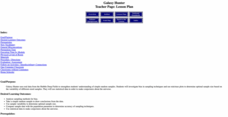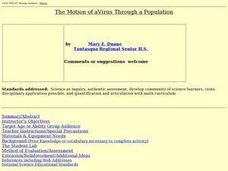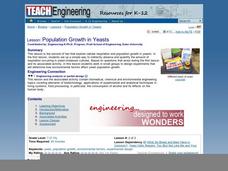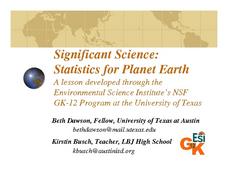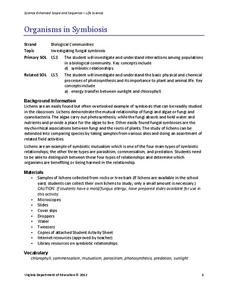Howard Hughes Medical Institute
Got Lactase? The Co-Evolution of Genes and Culture
Does the human body evolve as quickly as human culture? With a stellar 15-minute video, explore the trait of lactose intolerance. Only about 1/3 of human adults seem to still have the enzyme lactase and therefore, the ability to digest...
Curated OER
Galaxy Hunter - A Cosmic Photo Safari
Space science stars journey through our night sky and take virtual photos of galaxies to investigate simple random samples. Higher math is used to analyze the data collected. Copy the evaluation/assessment questions onto a handout for...
Howard Hughes Medical Institute
The Great Elephant Census Modeling Activity
They say elephants never forget—and your class won't forget an insightful modeling activity either! Junior zoologists take part in a mock elephant census using the sample count and total count methods. The included materials provide...
Howard Hughes Medical Institute
Tracking Genetically Modified Mosquitoes
What's that buzzing in your ear? An insightful lesson about genetically modified mosquitoes! Partnered pupils explore the creation, release, and monitoring of mosquitoes designed to reduce the mosquito population. After watching a video,...
Michigan State University
Bug Lyphe!
Introduce ecology classes to biodiversity and interdependence in ecosystems with a PowerPoint presentation. Then, they get up-close and personal with the invertebrate world by collecting insects, classifying them, and graphing their...
College Board
2014 AP® Biology Free-Response Questions
The most popular AP science exam, Biology, also maintains the highest passing rate. The College Board releases old test questions covering trichomes and much more, along with statistics and scoring guidelines to help scholars study for...
Texas State Energy Conservation Office
Investigation: Automotive Emissions and the Greenhouse Effect
It is recommended that you conduct this fabulous experiment as a whole-class demonstration. Collect air samples from the environment, human exhalation, and car exhaust, then compare them for carbon dioxide content using bromthymol blue...
Curated OER
The Motion of a Virus Through a Population
Learners test the factors that influence the rate at which a virus spreads through a population. They complete a lab activity then discuss data collected and review and answer a set of questions.
Curated OER
Hide and Seek Science
Pupils examine macro-invertebrates in order to better understand their link to the food web. Working in groups, they record observations of several areas of a stream or river, collect samples from the river bottom, and identify the...
Curated OER
Counting Animal Populations
Students learn how to count animal populations by the Mark and Recapture method. In this counting animal populations lesson plan, students begin by predicting amounts of different candies in a jar. Students then simulate using beans, two...
American Statistical Association
More Confidence in Salaries in Petroleum Engineering
Making inferences isn't an exact science. Using data about salaries, learners investigate the accuracy of their inferences. Their analyses includes simulations and randomization tests as well as population means.
Curated OER
Population Growth in Yeasts
Students design an investigation using yeast. In this environmental engineering lesson, students design an investigation to determine how environmental factors affect the growth of yeast. They will collect quantitative data and discuss...
Curated OER
Significant Science: Statistics for Planet Earth
Ninth graders discover how statistics are used to interpret results of scientific experiments. Students write hypotheses and test the hypotheses by collecting data and organizing the data. Students graph their data to produce a visual....
Curated OER
Zebra Mussel Population Simulation
Students are taught how to format and enter data into an Excel spreadsheet. They make a graph, and interpret graphed data. Students discuss the possible impacts of zebra mussels on the Hudson river. They graph zebra mussel data.
Virginia Department of Education
Organisms in Symbiosis
Searching for an activity that allows emerging biologists to explore symbiosis up close and personal? Pupils collect samples and view lichens through a microscope and conclude with a discussion about the relationship they have with other...
National Security Agency
Sampling for a Rock Concert
Over the course of three class periods, middle schoolers design an experiment to provide learner input to administration about which rock band to invite to play at school. They practice several random sampling exercises, all well...
NOAA
Importance of Deep-Sea Ecosystems – How Diverse is That?
When judging diversity of an ecosystem, both species evenness and species richness must contribute. After a discussion of diversity and a guided example using the Shannon-Weaver function, scholars use the same function on two other...
College Board
2016 AP® Biology Free-Response Questions
A remarkably high number of scholars passed the AP Biology exam in 2016 with over 61 percent earning college credit. The College Board released the entire free-response section for future scholars to study. After answering the eight...
Curated OER
People Are Like Peas in a Pod
Students experiment with pea pods to observe/appreciate the diversity of individuals within a population, and to explain of how dominant and recessive traits, genotypes, and phenotypes help produce variation in a population.
Howard Hughes Medical Institute
Stickleback Evolution Virtual Lab
How quickly do animals evolve? Can comparing different samples of the same fossil answer timeline questions? Scholars use virtual labs to examine fossils and learn about stickleback evolution. They compare pelvic morphology in lakes...
Curated OER
The Spread of Aids
This is an effective simulation of how communicable diseases such as AIDS can be spread throughout a population. Classmates exchange samples from their individual cups of liquid: one of them containing a dilute NaOH solution, and the...
Curated OER
Wetland vs. Stream Macroinvertebrates
A link to a comprehensive macroinvertebrate guide gives you the information needed to prepare for this field study activity. Sample macroinvertebrates are collected from areas representing different environmental conditions. Junior...
Curated OER
The Blue Mud Shrimp Mystery - Newport, Oregon
In 2003, there was an unprecedented decline in the population of Blue Mud Shrimp up in Oregon. This presentation gives many of the facts, and theories that were developed as to why the population took such a dive. Excellent photographs...
NOAA
What Killed the Seeds?
Can a coral cure cancer? Take seventh and eighth grade science sleuths to the underwater drugstore for an investigation into emerging pharmaceutical research. The fifth installment in a series of six has classmates research the wealth of...



